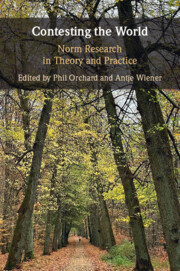Book contents
- Contesting the World
- Contesting the World
- Copyright page
- Contents
- Figures
- Tables
- Contributors
- Acknowledgements
- Abbreviations
- 1 Introduction
- Part I Norm Strength, Collisions, and Conflicts
- Part II Development of the Field
- Part III Meta-theorising, Linkages, and International Law
- Part IV Dimensions of Norm Contestation
- 12 Of Norms and Networks
- 13 Regulatory Contestation and the Creation of Transnational Legal Orders
- 14 Norms, Normativity, and Pragmatist Justification
- 15 Social in Practice, Contested in Principle
- References
- Index
13 - Regulatory Contestation and the Creation of Transnational Legal Orders
from Part IV - Dimensions of Norm Contestation
Published online by Cambridge University Press: 01 November 2024
- Contesting the World
- Contesting the World
- Copyright page
- Contents
- Figures
- Tables
- Contributors
- Acknowledgements
- Abbreviations
- 1 Introduction
- Part I Norm Strength, Collisions, and Conflicts
- Part II Development of the Field
- Part III Meta-theorising, Linkages, and International Law
- Part IV Dimensions of Norm Contestation
- 12 Of Norms and Networks
- 13 Regulatory Contestation and the Creation of Transnational Legal Orders
- 14 Norms, Normativity, and Pragmatist Justification
- 15 Social in Practice, Contested in Principle
- References
- Index
Summary
This chapter introduces the concept of regulatory contestation as a lens for analysing the development of transnational normative orders. It critiques mainstream conceptualisations of regulation in International Relations (IR) and international law as unnecessarily narrow and advances a broader definition of regulatory governance as actions that steer the flow of events towards specified regulatory goals. This definition allows for the analysis of the creative and generative function of regulation and shows that the process of regulatory contestation facilitates the mediation of international norms into varied social and political contexts. Studying regulatory contestation provides insight into the power dynamics that are shaping fundamental institutions of international order at a micro-level. The chapter illustrates this process through a case study of the accountability turn in the implementation of human protection norms. The recent proliferation of juridical and institutional mechanisms to prevent, protect and prosecute mass violations of human rights is indicative of an emergent transnational human protection order. It applies the lens of regulatory contestation to these global efforts. It concludes by considering the value of regulatory contestation as an analytical lens in IR, contributing to an understanding of constitutive processes that build transnational normative orders.
- Type
- Chapter
- Information
- Contesting the WorldNorm Research in Theory and Practice, pp. 219 - 235Publisher: Cambridge University PressPrint publication year: 2024

